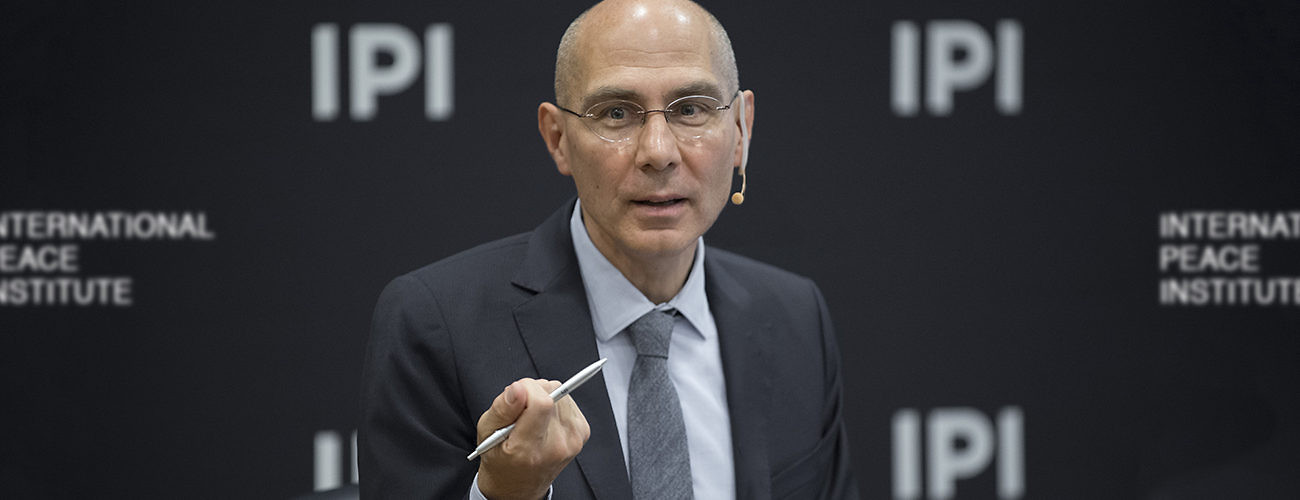“Listen to what refugees are telling us” was the simple advice that Volker Türk, Assistant High Commissioner for Protection at the United Nations Refugee Agency (UNHCR), gave to an IPI meeting on November 2nd on Addressing Contemporary Protection Challenges in Complex Crises.
He spoke at a time when displacement has reached critical dimensions, with 68.5 million people forced from their homes and in dire need of humanitarian assistance, and he said the only effective way to understand their plight and protect them was to listen to them.
“It’s very important to actually see and hear them and listen to what their stories are,” he said. “Refugees are the embodiment that something has gone awry in a country, that something has gone terribly wrong. There are issues why people leave, they don’t leave for the sake of leaving, they leave for a very good reason, and it’s related to essentially conflict, violence, human rights violations.”
He said too that some of their stories were encouraging ones. “Within these horror stories that we sometimes hear, there are also stories of incredible resilience.” In addition, he said, “sometimes refugees are portrayed only as victims. They are not victims, they are people just like us. It can happen to any of us.” Among the reasons they were targeted, he said, were political beliefs, women’s rights, LGBTQI identity, community disputes, and “disability.”
In response, he said, his office has encouraged the direct involvement of refugees in the UN’s work. “Refugees participate in the consultations, we had refugees be part of panels, they could speak from the plenary.” He said they also take part in a Global Refugee Forum and ministerial meetings and help “operationalize” what the new Global Compact on Refugees is supposed to do.
The Compact, which is scheduled to come before the UN General Assembly ahead of 2019, is the way the international community is organizing its response to the growing problem of massive displacement. It is seen as a unique opportunity to strengthen the international response to large movements of refugees and protracted refugee situations. It builds on existing international law and standards including the 1951 Refugee Convention and human rights treaties and seeks to better define cooperation to share responsibility.
Its four key objectives are:
- Ease the pressure on host countries
- Enhance refugee self-reliance
- Expand access to third-country solutions
- Support conditions in countries of origin for return in safety and dignity
Mr. Türk said that including refugees assured that “despite the fact that [the Compact] is global, it is very much happening at the local level, at the country level, with partners with the population that is directly affected.”
The Office of the UN High Commissioner for Refugees (UNHCR) is a program with the mandate to protect refugees, forcibly displaced communities, and stateless people, and assist in their voluntary repatriation, local integration or resettlement to a third country.
Recalling that he had worked on the subject of refugees for 30 years, Mr. Türk said the present moment was a “huge” one, with the private sector, the World Bank, and NGOs coming together in what he called an “organic process” to address the problem. One recent example, he said, was how the World Bank engaged as a financial instrument of support in the case of Rohingya refugees in Bangladesh who had been displaced en masse from their homes and villages in Myanmar.
Politics was a constant presence, but Mr. Türk said that it never caused him to lose sight of the real nature of his agency’s work. “Our work always, of course, takes place within a political framework,” he said, “but asylum, refugee protection is non-political and humanitarian.”
Noting how difficult the representation of refugees could be, he said he remembered when he went to one country and sought accreditation and the foreign minister responded, “You have a difficult task because you are protecting the people that we consider undesirable on our territory.”
In the end, he said, “We are very much driven by the fact that we know the people, we know the stories, we know what they tell us, and it engages you differently also with governments when you actually hear and you have the person right in front of you that tells you what happened to them when they fled Syria or Myanmar or Afghanistan or South Sudan. And it gives you a different authenticity, I think, in the way you engage.”
IPI Vice President Adam Lupel moderated the meeting.








